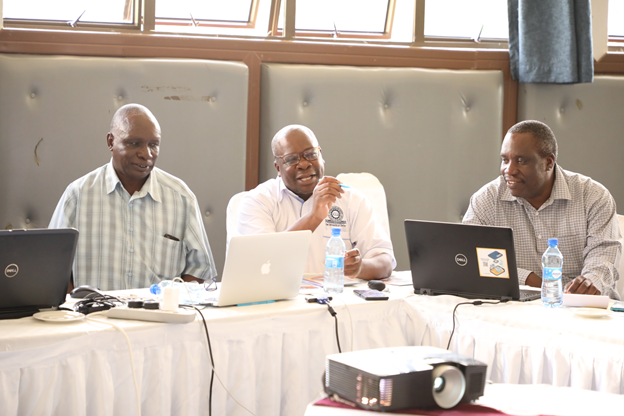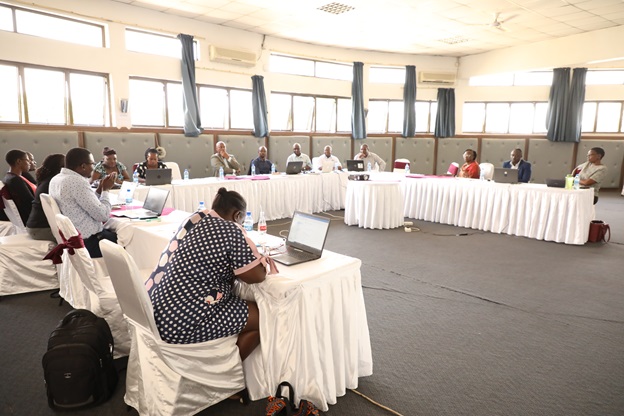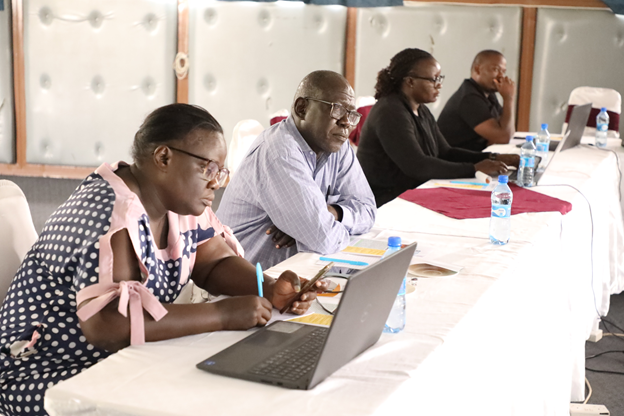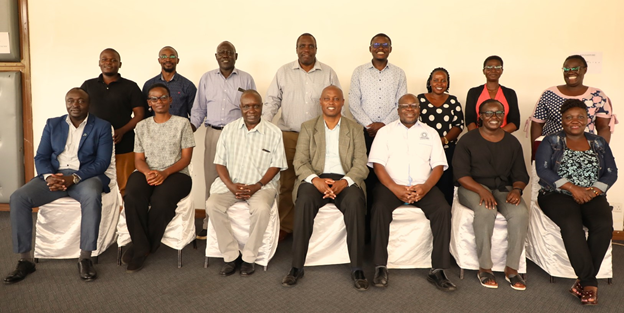The Masinde Muliro University of Science and Technology’s Scientists have called for collective action in addressing Antimicrobial Resistance (AMR) which is a serious global threat to human, animal, and environmental health. This was revealed during an workshop held on 30 June 2023 at Kisumu Hotel, with an aim to strengthen AMR monitoring and surveillance in East Africa. The scientists were Prof. William Shivoga (Principal Investigator), Prof. Francis Orata Omoto, and Dr. Anthony Sifuna who won the Global Challenges Research Fund (GCRF) funding/Grant. This is a UK fund that supports cutting-edge research to address challenges faced by developing countries.
The focus of the research is to identify knowledge gaps and offers solutions, particularly on preventing and managing chemical and biological pollution from the pharmaceutical manufacturing, agriculture, healthcare sectors, and municipal waste.
The objectives of the workshop themed ‘Antimicrobial Resistance Monitoring and Stewardship’ was to assess Abs residues and ARGs in wastewater and waste disposal sites, explore avenues of Community Engagement for the reduction of AMR, implement an eco-hydro wetland to remove Abs and ARGs from wastewater, and to determine the economic burden of AMR. In order to address antimicrobial resistance, all clinicians must become stewards of antimicrobials by prescribing them appropriately and educating their patients and colleagues on the proper use of this increasingly scarce medical resource.

The Principal Investigator, Prof. William Shivoga (left), Dean SONAS, Dr. Joseph Owino (speaking) together with Dr. Anthony Sifuna during the workshop.
The workshop brought together key stakeholders in wastewater treatment and in the health sector to discuss issues of antimicrobial resistance. They included representatives from National Environment Management Authority (NEMA), Kisumu Water and Sanitation Company Limited (KIWASCO), Kisumu County Antimicrobial Stewardship Committee (KCASIC), and the Public Health sector.
The workshop was graced by the Deputy Vice-Chancellor (Planning, Research and Innovation) Prof. Charles Mutai. He encouraged the researchers to ensure that their findings inform the policies at both county and national levels in order to curb the global threat. He emphasized that it is important to strengthen environmental action in response to Antimicrobial Resistance.
“Environment plays a key role in the development, transmission, and spread of AMR. Therefore, the response must be based on an environmental approach that recognizes that humans, animals, plants, and the environment are interconnected. Prevention is at the core of the action needed to halt the emergence of AMR,” said Prof. Mutai.
The Dean, School of Natural Sciences (SONAS), Dr. Joseph Owino who was also present at the event pointed out that self-medication is very prevalent and that any approach to deal with AMR cannot ignore it.
“AMR needs the urgent attention of representative authorities. Furthermore, conducting awareness seminars and implementing new policies to prevent the sale of antibiotics without prescription could play a vital role in bringing this alarming issue under control,” reiterated Dr. Owino.
Prof. William Shivoga gave the overview of the project explaining that the focus of AMR spread in wastewater and water systems
“Most wastewaters from hospitals, pharmaceuticals, households, and industries have AMR contamination that is untreated and discharged into water sources. The situation is aggravated by open defecation, pi latrines, and septic tanks especially in rural and sub-urban communities not served by sewer systems,” he revealed.

The AMR workshop participants following a presentation during the workshop.
In his presentation, Prof. Orata gave a highlight on Chemicals of Emerging Concern (CECs), including construction materials, pesticides, textile chemicals, pharmaceuticals, electrical chemicals, and pesticides found in water that make it easy for AMR to thrive. He also took participants through the history of water antimicrobials.
“There are several advanced measures of wastewater treatment. They include exploiting microbial diversity, and metabolic diversity, and applying enhanced Oxidative Aeration to remove antibiotics and other pollutants from wetlands. We need to look at frontier research to enable effective stewardship and tackling of this global burden of AMR,” stated Prof. Orata
Similarly, Dr. Anthony Sifuna, who presented on ‘Antimicrobial Resistance Gene, Waste Water and Water Supply Systems in Urban Settings’ pointed out that AMR in Sub-Saharan Africa (SSA) has a lot to do with urbanization, adding that water sources are another ‘big player’ in the transmission of AMR.
“Impacts of antimicrobial resistance caused by the massive growth in the urban population in South SSA. This stems from the unplanned growth of cities which is accompanied by poor housing, sanitation as well as the increased spread of diseases. Additionally, the inadequate public health system has allowed poorly regulated private provision services thereby causing increased misuse and abuse of antibiotics- a key factor in the growth of AMR,” he stated.
Another presenter, Dr. Juddy Susan Arieko from NEMA who presented on ‘NEMA Environment Enforcement Activities in Kisumu City’ noted that there is a need to carry out more research and form a taskforce at the county level to spearhead research on AMR. She added that the adoption and implementation of a circular economy and enforcement of incinerators are key measures to promote AMR.

Ms. Caroline Omollo his counterpart from KIWASCO and other representatives from the Public Health sectors.
Presenting on the ‘Kisumu County AMR Focal Point Activities’, Dr. Mitchel Okumu from KCASIC shared their experience in Kisumu County in dealing with Antimicrobial Resistance. “Antimicrobial Resistance requires a concerted effort by all stakeholders. Kisumu is one of the 14 counties that have come up with a work plan on how to address Antimicrobials. From our activities, we discovered that the local pharmacies and dental clinics are the places practicing inappropriate use of Antimicrobials,” said Dr. Okumu.
Ms. Caroline Omollo from KIWASCO presented on Fecal Sludge treatment in the Kisat wastewater treatment plant and warned that the reuse of sludge has to be done carefully and that farmers need not use it for crops unless it has been tested.
In order to preserve the utility of these life-saving drugs, we must use antibiotics wisely. The effectiveness of antibiotics, antivirals, and antifungals is now in jeopardy because a number of antimicrobial treatments that once worked no longer do so because microorganisms have become resistant to them. To curb AMR effectively, all sectors must join forces and encourage the prudent use of antimicrobials, as well as preventive measures.
By Linet Owuor and Lydia Anyonje
Photos by Shiundu Masafu





